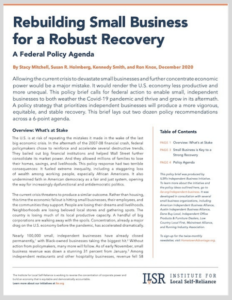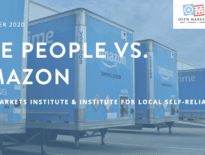In this policy brief, we argue that moving aggressively to rebuild small, independent businesses and reverse the concentration of corporate power would produce a more vigorous, equitable, and stable recovery. We call for federal action to enable small businesses to weather the pandemic, and for changes in policy to address monopoly power, access to capital, and other issues that have long impeded small businesses and left them vulnerable to the current crisis.
 Rebuilding Small Business for a Robust Recovery lays out two dozen specific policy recommendations as part of a 6-point agenda focused on helping small businesses survive the pandemic and flourish after it. The agenda includes numerous policies that can be adopted by the incoming Administration, as well as recommendations for Congress.
Rebuilding Small Business for a Robust Recovery lays out two dozen specific policy recommendations as part of a 6-point agenda focused on helping small businesses survive the pandemic and flourish after it. The agenda includes numerous policies that can be adopted by the incoming Administration, as well as recommendations for Congress.
Key recommendations include:
- Nominate a strong Federal Trade Commission committed to using the agency’s rule-making authority to address monopolistic abuses by dominant corporations, including digital gatekeepers
- Overhaul the U.S. Small Business Administration, including reconfiguring its loan guarantee programs to deliver more funding to truly small and independent businesses
- Aggressively fund local government small business assistance programs, including reestablishing the State Small Business Credit Initiative and setting up a fund for Community Land Trusts to acquire commercial buildings and stabilize small business rents
- Cap credit card swipe fees, which are 6 to 7 times higher here than in Europe, where they are regulated
- Ensure that small businesses have a fair chance to compete for federal spending by putting the brakes on the GSA’s pilot program to shift federal procurement of goods to a private platform (e.g., Amazon)
These recommendations could help the federal government avoid the mistakes made in the wake of the 2007-08 financial crisis, when millions of Americans lost their homes and savings while policy makers responded by bailing out big financial institutions and Wall Street. That misguided response led to two devastating, long-lasting consequences: It fueled extreme income inequality, and undermined faith in American democracy as a fair and just system.
Rather than the housing sector, however, the current economic fallout is decimating America’s small businesses. Nearly 100,000 small, independent businesses have already closed their doors permanently, with Black-owned businesses taking the biggest hit. As of early November, small business revenue was down a stunning 31 percent from January. As small businesses close or hang on by their fingernails, meanwhile, a handful of big corporations are recording massive profits, increasing their already-dominant market share, and dramatically accelerating concentration of the economy.
While the pandemic may be the immediate culprit driving these trends, the reason small businesses have been so vulnerable to this crisis is that decades of policy decisions have weakened small businesses while allowing dominant corporations to grow unabated. Policies that have led to an uneven playing field for America’s small businesses include:
- Lax antitrust enforcement that has allowed rampant market power abuse by large companies.
- Banking policies that have constrained the flow of credit to small businesses.
- Tax policies that have given giant companies an unfair financial advantage.
Across the country, the economic fallout from these policies and the pandemic is hitting small businesses, their employees, and the communities they support. People are losing their dreams and livelihoods. Neighborhoods are losing beloved local stores and gathering spots. The country is losing much of its local productive capacity. To answer this generational challenge, we must have a federal economic recovery strategy focused on rebuilding, creating, and growing America’s small, independent businesses.
The policy brief is available here.
If you like this report, be sure to sign up for the monthly Hometown Advantage newsletter for our latest reporting and research.





